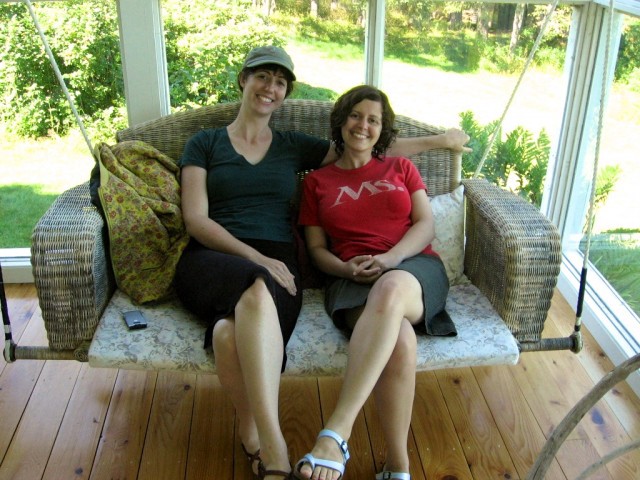Solidarity Forever! Talking With a Radical Coop-Living Bride

Ester: Hello! Could you introduce yourself in a general way?
Rebecca: Um, I am a radical leftist extrovert nerd feminist Jew. I work as a fundraiser and communicator for a racial and economic justice community organization. I have lived all over the world and the East Coast.
Ester: And you are getting married this weekend!
Rebecca: That too! I am a “bride” and a “fiancee” (though I don’t identify as the latter). I am a partner to my partner as I have been for a while and a housemate and householder-homeowner-homemaker with three other people including said partner.
Ester: Your housing situation is unusual and — I think — fascinating. Can you describe it a little before we get into the details of the upcoming nuptials? Billfolders love real estate.
Rebecca: My partner and I were living in an awesome co-op house with four other folks, and our dear friends MB and JB also lived in an awesome co-op house. We all wanted to keep living the big-house-with-lots-of-people lifestyle and in several cases had done that from during college. So 10+ years into grownup co-op life I didn’t want to get married and disappear from my friends and really from myself into some partnered love/torture cave of nuclear family loneliness.
We talked with MB/JB a lot about living together and then there was this crazy confluence/opportunity: 3 sets of mutual friends own houses on the same block and we sort of happened on an open house on said block. The house was in some ways just another rowhouse but in others really ideal for a 2-family shared situation — like, there’s sort of 2 suites of bedroom/office/bathroom on the second floor, and a big 2-car garage, which is unusual in our city… so all of a sudden we were like OK let’s buy this thing. A week later (and a lot of fevered financial dealings, honestly) we had an offer accepted.
Ester: This, I should tell you, was always my childhood dream. To live with and among friends. And I’m sure I’m not the only one. But did you envision something like this when you were young, or younger?
Rebecca: This has been my dream as well, since let’s say college. It was always a little vague because it seemed sort of impossible: how do you find the right people who are also ready and willing at the time, etc.? I sometimes imagined myself in a bigger commune-y kind of thing but I like living in the city. I seriously feel very lucky and blessed to have these friends who were down for the whole idea and all of us are just having the best time. Lots of people’s response is like yours — they want this kind of thing too. It’s shocking to me that more people don’t try for it, but it is pretty unusual.
Ester: My best friend lived in an anarchist co-op once and she hated it; no one washed their dishes. And I lived on kibbutz once. It was less than ideal. But I think the reason a lot of people don’t try it is that it’s hard enough to mingle finances with one individual, a romantic partner — the idea of getting your money tied up with that of another couple can be pretty daunting. Money can kill relationships faster than anything, after all, except sex.
Rebecca: In a way I think having housemates kind of clarifies my relationship with my partner — i.e. we are romantic partners of course, but also we are housemates and householders together. It can take the sting out of domestic disputes when there are more people — you see that different ways of living are all sort of relatively fine, rather than being invested in my partner homemaking with me in some ideal Ward-and-June way. I can also homemake with these other folks — like, we all have our projects and chores we like, and the ones we don’t like. It takes pressure off the partner relationship for me. Also when we fight we have these close friends right by us to help us sort it out! I know that would be crazy for many people but I think privacy is overrated.
Ester: Tom Friedman apparently agrees with you, or at least thinks our generation does.
Rebecca: I can’t believe you compared me with Tom Friedman. Kinehora, toi toi toi.
Ester: We’ve been friends for fourteen years! You think I don’t know how to make you angry? Or could pass up such an easy opportunity? 🙂
Rebecca: Fine. Sucker punch the radical feminist.

Thomas L. Friedman, Paid to Have Opinions by The New York Times
Ester: So, speaking of sucker punching radical feminists, let’s talk about your wedding! It is happening this weekend. How do you feel? Especially about the financial aspects of it? We’ve been talking about money and weddings a lot on the site lately — how difficult it can be to make sure the couple and their families are on the same page.
Rebecca: Pretty good. There’s a bunch of logistical and crafting shit to get done but basically I am super psyched about my muffin and can’t wait to marry him so hard. Financially, we are doing great I think — from the meta level — we started out in different places. I wanted to have a detailed budget and stay within it, and then reallocate across areas if we saved on X spend on Y etc etc., and he wanted to just sort of trust that we have good values and wouldn’t waste money on dumb shit. That kind of freaked me out but then as it started getting planned we did a little of both and mostly have erred on the side of his approach.
Ester: Ah, compromise! The mother of harmony. Although also sometimes the mother of everyone being kind of unhappy and sulking. In your case though the byproduct seems to be mostly harmony?
Rebecca: So far. A few days left to have a fight! Mostly our disagreements have been about who’s doing how much work. (A great feminist fight to have.) Our parents have been pretty chill — they basically gave us money and we asked them for a few preferences/hopes each.
Ester: Were your parents’ concerns mostly about the ceremony or the reception?
Rebecca: All their needs were about ritual or stuff like that rather than “we must have fancy food” or whatever. Like, my mom wanted both her and my dad to walk me down the aisle, which we were already planning on. His mom wanted the families to stand by the chuppah rather than being in the audience, which was totally cool. My dad, who isn’t Jewish, just wanted me to explain Jewish wedding stuff to him beforehand (“just give me an index card with notes so I know what’s happening!”) Ari’s dad wanted us to do a brunch the morning after, which we actually nixed.
Ester: Ah yes! The brunch after is a terrible idea. We caved to pressure to do that — actually we caved to pressure about everything, but that’s a different story — and when I woke up for brunch found that I had lost hearing in one ear. I was in no mood to go be the bride AGAIN, especially when I was concerned about my partial deafness, but I had no choice.
Rebecca: Your wedding was awesome. It was definitely a Marge Bloom production. But yeah, screw the brunch, let the parents plan their own brunch if they want to hang with their relatives. (I think they are.)
Ester: (Good.) Do you anticipate your wedding changing the nature of your relationships to your housemates at all? In fact, do you anticipate your wedding changing anything?
Rebecca: Not really. I think it’s going to be a great bonding experience to do this together — their wedding last year was really meaningful to us, and we got to be very close to them throughout, helping with stuff and entertaining them and holding space for them. They have done so much to help that it kind of feels like we are marrying them too.
Ester: That is so cute. If group marriage were allowed, would you be tempted?
Rebecca: We actually are working on a legal contract that outlines the house financial rules/responsibilities and were thinking of having a small ceremony/party once we are done writing and signing it. So that’s kind of what that is, right?
Ester: Absolutely. A ketubah! Especially if you all register for a Honeyfund. Are you doing anything like that for your wedding, by the way?
Rebecca: Absolutely not. I don’t think it’s appropriate to ask for cash gifts even if you specify what the cash is for. We made a registry with SoKind that has a bunch of housewares-y special stuff, like a seder plate and a fancy challah board, and also several tzedakot (places to make donations — including both our nonprofits, and the Jewish organization through which we met, and some antipoverty organizing stuff) but that was more so that random relatives who wanted to Buy A Gift would have some guidance and not buy stuff we didn’t like. This was probably the thing we debated the most. We’re more or less OK on housewares (though it’s awesome to get special things we wouldn’t probably buy ourselves) and didn’t want to acquire tons of extraneous items BUT also didn’t like the idea of receiving gifts that weren’t to our taste and then we’d feel bad about regifting or whatever.

Ester: Did you find it difficult to plan a wedding — which is almost by definition a bourgeois event — according to your radical values?
Rebecca: Not really. I believe pretty deeply in the idea of joyful celebrations and that’s pretty much what the Jewish wedding is all about. We’re not getting civilly married, for several reasons — 1. Marriage equality still not being everywhere (we might get civil-married when it’s legal in the whole US), 2. Why does the government do marriage anyway at all? (Anarchist principles of mine), 3. Jewish marriage is real marriage — this is the community I am part of and a legal system given credence by my own people
Ester: Are you concerned about not benefiting from the legal protections of civil marriage in case you have children or if one of you is hospitalized, that kind of thing?
Rebecca: Bio-children have legal relationships to both their parents totally regardless of whether their parents are married. Re: hospital — we’re going to benefit from straight privilege if, god forbid, that is ever an issue — we’re a white, middle class man and woman wearing matching gold rings, I think that we’re going to be taken seriously and respected as a couple. For other financial protections, we are joint-ifying our bank accounts etc, and writing wills and living wills that should stand. So we’re doing the things that same-gender or genderqueer couples do to protect their relationships without marriage equality. Maybe someday we will get civilly married. Just this morning we were so happy about PA and my partner said to me “I think I am going to want to civilly marry you.” Awwww!
Ester: Awwww indeed! OK well mazel tov on the happy event. Any last words of wisdom for other couples trying to navigate the choppy waters of staying true to radical principles while planning a wedding or co-operative living?
Rebecca: Two things. One, it was great for us to figure out what core metaphors we wanted to build our marriage around. In a weirdly traditional way for me the basic point of the marriage was to share resources and make a household together in which we could raise children. Not all the companionate, romantic stuff — that’s not marriage, that’s just a relationship. So many of our early conversations about marriage were all about money — how much we had, how much we wanted to share, how we planned to use it and get it… a huge breakthrough was deciding together to tithe at least 10% and working towards 20% of our earnings for the rest of our lives. As they say “everything fell into place after that.” Two: on radical principles: to build an ideal society with everyone in the world, it helps to practice building an ideal mini-society with one (or three) other person(s).
Further questions or congratulations for Rebecca? Let me know — ester AT the billfold DOT com — and I’ll pass them along!
Support The Billfold
The Billfold continues to exist thanks to support from our readers. Help us continue to do our work by making a monthly pledge on Patreon or a one-time-only contribution through PayPal.
Comments